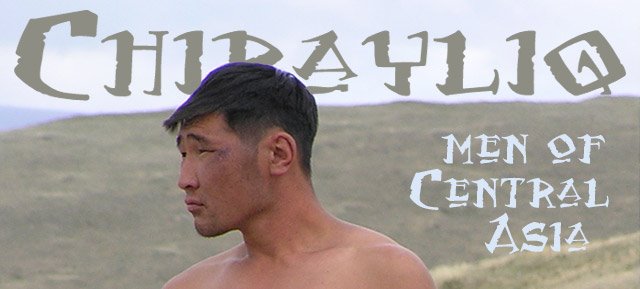Yerbolat is a Kazakh hiphop/R'n'B artist whose songs have strong elements of Kazakh folk music. The lyrics of this song - Мен Казакпын - are a poem written by Dzhuban Moldagaliev in 1964.
Here is a literal translation of one of the verses (from Kazakh to Russian, then to English by me - thanks to Dzhon at bb.ct.kz for the Russian translation!):
I am Kazakh, I have died and come back to life a thousand times, in order to continue the story through my life.This poem, and also the video, which is like a smplified crash course on Kazakh history, with some sports heroes thrown in at the end, could perhaps be seen as blatant nationalism.
If I cried, the sun darkened in the sky, and if I laughed - the darkness receded from my eyes.
I am Kazakh, in my own way I am also great.
I am like a new, seventh continent between old Europe and ancient Asia,
but I am used to being with all other peoples. I've wandered around in the night until I was exhausted.
A mighty explosion helped me find myself.
I have arisen from the dark, like an island from the bottom of the ocean,
And I walked to the threshold of the blinding sun.
But Kazakhstan is in the process of decolonization. The Kazakh Khanate was incorporated into the Russian Empire and colonized from the 18th century onward. After the Russian revolution, there was a brief period of autonomy, aligned with the White Army, until the Bolshevik authorities took control over the territory. During its time as a Soviet autonomous republic, people of many different ethnicities were deported to Kazakhstan, and many more voluntarily settled there as Kazakhstan came to be a vital part of the Soviet Union in terms of agriculture and industry. Supposedly, by the 1970's Kazakh SSR was the only Soviet republic in which the eponymous nationality was a minority in its own republic.
When Moldagaliev wrote the poem, there was, since the end of the war and especially with destalinization, a trend in Soviet culture of positive encouragement of the ethnic minorities in the USSR. Many literary magazines in minority languages were founded, and this is also when Chingiz Aitmatov wrote his popular books set in the Kirghiz SSR, drawing on local folklore.
Now Kazakhstan is an independent nation, but the Soviet period has left behind "a dominating class of Russian technocrats, who are necessary to economic progress but ethnically unassimilated" (says Wikipedia). Most people in Kazakhstan, regardless of ethnicity, speak Russian with each other.
There are efforts to build up positive "national self-esteem" among Kazakhs - teaching children the Kazakh language in school is one, and popular music fusing traditional music styles with Western styles is one - dombra, or even overtone singing ...
In the case of rap, hiphop and R'n'B, the counterculture of an oppressed group in another country (African Americans), struggling for a positive, independent self-image, is fused with local culture to form a counterculture of your own - true internationalism?
Anyway, let's see if I can name all the historical images used in this video ...
0:01 - Bronze age petroglyphs, perhaps at Tamgaly?
0:07 - Horseback warriors, symbolizing the ancient nomadic cultures on Kazakh territory.
0:40 - Mausoleum of Sufi Khoja Ahmad Yasavi, erected by Timur in the city Turkestan
0:50-0:53 - People playing the dombra?
1:04-1:08 - Some early 20th century footage
1:20 - Yuri Gagarin lifting off from Baikonur (in Kazakh SSR)
1:24 - Kazakh cosmonaut Talgat Musabayev
1:29 - WWII bombings?
1:33 - Nuclear bomb testing
1:40 - People demonstrating against nuclear weapons? (The sign the lady carries has a crossed out missile or rocket, but I can only discern the word "нет", "no".)
1:44 - This footage really puzzles me - maybe it's related to the demonstrations?
1:50 - In the late 80's, the ethnic Kazakh First Secretary of the Communist Party of Kazakh SSR was dismissed by Gorbachev, and an ethnic non-Kazakh with no previous experience in the Kazakh SSR was set to replace him. This sparked massive riots.
1:55 - A train - the railroads are very important pillar of Kazakhstan's infrastructure.
1:56 - Oil industry
2:05 - President Nursultan Nazarbayev flies the new Kazakh national flag shortly after independence.
2:08 - Nuri meets his people
2:16 - Wheat fields
2:18 - Oil industry again
2:20 - Views on Astana, with the Astana tower
2:24 - I actually don't know most of the sportsmen and -women here ... But I'll try. 2:46 is probably Assan Bazayev? 2:56 is judoka Askhat Zhitkeyev. 3:00 is Irina Nekrasova, and 3:07 is Ilya Ilin.
3:24 - An eagle hunter, tying the knot back to ancient and still prevailing Kazakh culture.





1 comment:
Thanks for this well-written post - you've been working hard! Mashallah molodets! (That's going to be my new catchphrase.)
I first learned about the 1980's riots from Nurzhan. There were so many young people, especially students, involved, and some of them were apparently never really rehabilitated although they fought for self-determination.
http://en.wikipedia.org/wiki/Jeltoqsan
Post a Comment